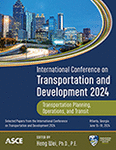Modeling Electric Vehicle Charging Load Using Origin-Destination Data
Publication: International Conference on Transportation and Development 2024
ABSTRACT
The accelerating adoption of electric vehicles (EVs) poses challenges to the power grid, necessitating precise representation of mobility patterns for effective infrastructure upgrades. Traditional simulation-based charging demand estimation faces limitations in generating trip chains reflective of actual travel patterns without complex network modeling. Hence, an innovative agent-based trip chain generation model is introduced to overcome these challenges. Drawing from the National Household Travel Survey (NHTS) and the NextGen NHTS origin-destination add-on data for Clarke County, Georgia, this study proposes a simulation method capturing both temporal and spatial mobility patterns without relying on extensive network topology data. The resulting trip chains predict EV charging load at the Census Block Group level, validated with a 1.03 correlation to actual trip counts, affirming their reflective accuracy. Two charging scenarios, residential-only and charging-everywhere, reveal distinct demand profiles. The charging-everywhere scenario aligns closely with the trip profile, while the residential-only scenario exhibits an afternoon peak slightly surpassing the former. This study contributes a data-driven charging demand estimation methodology, offering critical insights for grid resiliency planning amid the evolving landscape of EV adoption.
Get full access to this chapter
View all available purchase options and get full access to this chapter.
REFERENCES
Amara-Ouali, Y., P. Massart, J.-M. Poggi, Y. Goude, and H. Yan. 2021. “A Review of Electric Vehicle Charging Session Open Data: Poster.” Pp. 278–79 in Proceedings of the Twelfth ACM International Conference on Future Energy Systems, e-Energy ’21. New York, NY, USA: Association for Computing Machinery.
Falvo, M. C., D. Sbordone, I. Safak Bayram, and M. Devetsikiotis. 2014. “EV Charging Stations and Modes: International Standards.” Pp. 1134–39 in Automation and Motion 2014 International Symposium on Power Electronics, Electrical Drives.
Federal Highway Administration. 2017. “National Household Travel Survey.”
Frendo, O., J. Graf, N. Gaertner, and H. Stuckenschmidt. 2020. “Data-Driven Smart Charging for Heterogeneous Electric Vehicle Fleets.” Energy and AI 1:100007. https://doi.org/10.1016/j.egyai.2020.100007.
Gong, L., W. Cao, and J. Zhao. 2017. “Load Modeling Method for EV Charging Stations Based on Trip Chain.” Pp. 1–5 in 2017 IEEE Conference on Energy Internet and Energy System Integration (EI2).
Kang, C., and T. Zhang. 2018. “Realistic Traffic Data Based Mobility Modeling and Simulation of Smart EV.” Pp. 854–57 in 2018 IEEE Third International Conference on Data Science in Cyberspace (DSC).
Kara, E. C., J. S. Macdonald, D. Black, M. Bérges, G. Hug, and S. Kiliccote. 2015. “Estimating the Benefits of Electric Vehicle Smart Charging at Non-Residential Locations: A Data-Driven Approach.” Applied Energy 155:515–25. doi: https://doi.org/10.1016/j.apenergy.2015.05.072.
Ku, A., D. M. Kammen, and S. Castellanos. 2021. “A Quantitative, Equitable Framework for Urban Transportation Electrification: Oakland, California as a Mobility Model of Climate Justice.” Sustainable Cities and Society 74:103179. https://doi.org/10.1016/j.scs.2021.103179.
Liu, Y., W. Liu, S. Gao, Y. Wang, and Q. Shi. 2022. “Fast Charging Demand Forecasting Based on the Intelligent Sensing System of Dynamic Vehicle under EVs-Traffic-Distribution Coupling.” Energy Reports 8:1218–26. doi: https://doi.org/10.1016/j.egyr.2022.02.261.
Liu, Y. S., M. Tayarani, and H. Oliver Gao. 2022. “An Activity-Based Travel and Charging Behavior Model for Simulating Battery Electric Vehicle Charging Demand.” Energy 258:124938. https://doi.org/10.1016/j.energy.2022.124938.
Moradipari, A., N. Tucker, and M. Alizadeh. 2021. “Mobility-Aware Electric Vehicle Fast Charging Load Models With Geographical Price Variations.” IEEE Transactions on Transportation Electrification 7(2):554–65. doi: https://doi.org/10.1109/TTE.2020.3025738.
Muratori, M. 2018. “Impact of Uncoordinated Plug-in Electric Vehicle Charging on Residential Power Demand.” Nature Energy 3(3):193–201. doi: https://doi.org/10.1038/s41560-017-0074-z.
Muratori, M., and T. Mai. 2020. “The Shape of Electrified Transportation.” Environmental Research Letters 16(1):011003. https://doi.org/10.1088/1748-9326/abcb38.
Pareschi, G., L. Küng, G. Georges, and K. Boulouchos. 2020. “Are Travel Surveys a Good Basis for EV Models? Validation of Simulated Charging Profiles against Empirical Data.” Applied Energy 275:115318. https://doi.org/10.1016/j.apenergy.2020.115318.
Shahriar, S., A. R. Al-Ali, A. H. Osman, S. Dhou, and M. Nijim. 2020. “Machine Learning Approaches for EV Charging Behavior: A Review.” IEEE Access 8:168980–93. doi: https://doi.org/10.1109/ACCESS.2020.3023388.
Shepero, M., and J. Munkhammar. 2018. “Spatial Markov Chain Model for Electric Vehicle Charging in Cities Using Geographical Information System (GIS) Data.” Applied Energy 231:1089–99. doi: https://doi.org/10.1016/j.apenergy.2018.09.175.
Walz, K., D. Contreras, K. Rudion, and P. Wiest. 2020. “Modelling of Workplace Electric Vehicle Charging Profiles Based on Trip Chain Generation.” Pp. 459–63 in 2020 IEEE PES Innovative Smart Grid Technologies Europe (ISGT-Europe).
Xiang, Y., S. Hu, Y. Liu, X. Zhang, and J. Liu. 2019. “Electric Vehicles in Smart Grid: A Survey on Charging Load Modelling.” IET Smart Grid 2(1):25–33. doi: https://doi.org/10.1049/iet-stg.2018.0053.
Xing, Q., Z. Chen, Z. Zhang, X. Huang, Z. Leng, K. Sun, Y. Chen, and H. Wang. 2019. “Charging Demand Forecasting Model for Electric Vehicles Based on Online Ride-Hailing Trip Data.” IEEE Access 7:137390–409. doi: https://doi.org/10.1109/ACCESS.2019.2940597.
Yu, R., W. Zhong, S. Xie, C. Yuen, S. Gjessing, and Y. Zhang. 2016. “Balancing Power Demand Through EV Mobility in Vehicle-to-Grid Mobile Energy Networks.” IEEE Transactions on Industrial Informatics 12(1):79–90. doi: https://doi.org/10.1109/TII.2015.2494884.
Zhang, J., J. Yan, Y. Liu, H. Zhang, and G. Lv. 2020. “Daily Electric Vehicle Charging Load Profiles Considering Demographics of Vehicle Users.” Applied Energy 274:115063. https://doi.org/10.1016/j.apenergy.2020.115063.
Zhang, L., T. Brown, and G. Scott Samuelsen. 2011. “Fuel Reduction and Electricity Consumption Impact of Different Charging Scenarios for Plug-in Hybrid Electric Vehicles.” Journal of Power Sources 196(15):6559–66. doi: https://doi.org/10.1016/j.jpowsour.2011.03.003.
Zhao, Y., Z. Wang, Z.-J. Max Shen, and F. Sun. 2021. “Data-Driven Framework for Large-Scale Prediction of Charging Energy in Electric Vehicles.” Applied Energy 282:116175. https://doi.org/10.1016/j.apenergy.2020.116175.
Information & Authors
Information
Published In
History
Published online: Jun 13, 2024
Authors
Metrics & Citations
Metrics
Citations
Download citation
If you have the appropriate software installed, you can download article citation data to the citation manager of your choice. Simply select your manager software from the list below and click Download.
